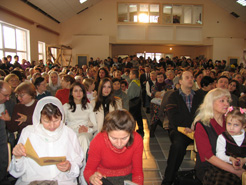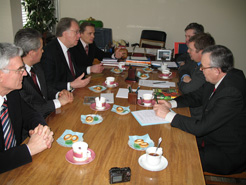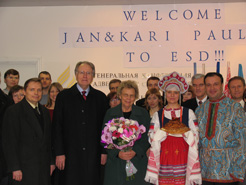For many years we in the West were encouraged by the faith and courage of Russian Adventists," Pastor Jan Paulsen, world president of the Seventh-day Adventist Church, told members and leaders during a Moscow visit to share in the celebrations of 120 years of Adventism in Russia. During the five-day trip, he also met with officials of the Russian Federation, including representatives of President Vladimir Putin.
Heading the Russian Federation delegation was Michael Ostrovsky, the associate to the head of the Internal Politics Department. Also present were Sergei Melnikov, advisor to the head of the department, and Alexander Kudriavtsev, associate to the chairman of the Committee on Relations With Religious Organizations.
Ostrovsky began the meeting by expressing his satisfaction with the activities of the Seventh-day Adventist Church in the territory of the multi-confessional Russian Federation.
Paulsen was joined by Pastors Artur Stele, president of the Adventist Church's Euro-Asia region; Victor Vitko, Euro-Asia Public Affairs and Religious Liberty (PARL) director; Vasily Stoliar, West Russian regional church president; and Oleg Goncharov, PARL director for West Russia.
"This meeting was beneficial in that the [state] President's administration heard about the life of the Adventist Church, and we could discuss church and state relations," said Pastor Paulsen, who was accompanied by his wife, Kari.
During the discussion, Pastor Paulsen spoke about the Adventist Church's global reach and its educational, medical and charitable activities. He noted that the Adventist Development and Relief Agency, ADRA, helps all people, irrespective of race, religion or social status. He stressed that two of the Adventist Church's goals are to be good citizens in every nation, and to perform good works for the community.
Paulsen also participated in a "family celebration" among Euro-Asia church leaders and employees, noting the 15th anniversary of the area's creation by the world church. Known formally as the Euro-Asia Division, it is one of 13 trans-national administrative regions of the worldwide Adventist church.
While 15 years is a brief passage in the life of an individual, Paulsen noted, the last 15 years in the Euro-Asia region has brought great change and growth, he said. Starting with 37,453 members, the Seventh-day Adventist Church has grown to 143,459 adult Adventist Christians. There are now six large geographical administrative areas, formally known as unions, within the Euro-Asia region. These encompass 21 local conferences, or diocese, as well as two attached areas and 15 areas that the church has designated as missions.
"Among other anniversary celebrations will be a ceremony at Zaokski Adventist University, the dedication of a new Adventist church to the south of Moscow, and meetings with leaders of the church in the Euro-Asia region.
In Adventist history, Russia was among the first countries where the church established its presence as part of its world wide mission outreach. An Adventist minister preached in Russia in 1886. Seventh-day Adventists formed a Russian church organization in 1909, despite active government opposition. The church structure was largely destroyed during the Soviet period. Then, after World War II, the All-Union League of Seventh-Day Adventists was established. The formal church administration was inactive from 1960 until 1990, when it was included in the worldwide General Conference of Seventh-day Adventists. [Editors: Valery Ivanov and Christian B. Schaeffler for ANN/APD]


